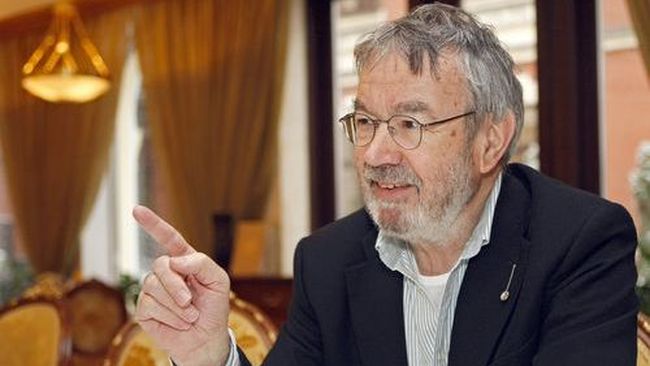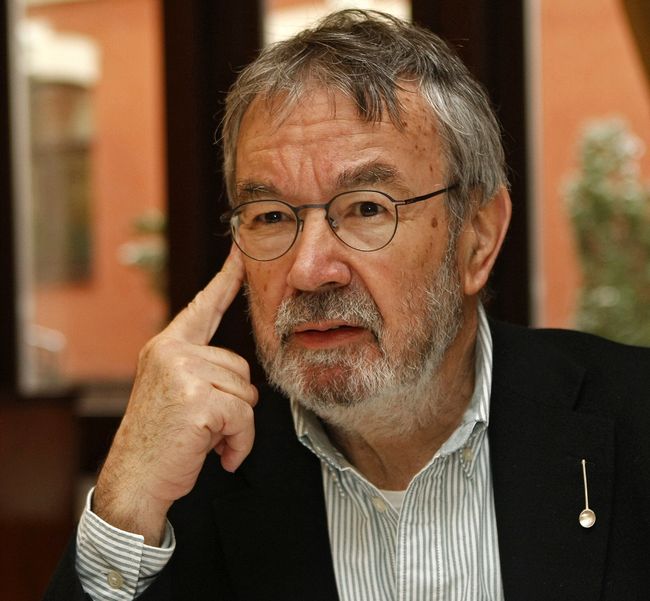“Ukraine is part of my greater homeland”
The Chernivtsi publishing house “Books – XXI” has published To Galicia, a documentary book by the Austrian writer Martin Pollack
Martin Pollack (born 1944) is an Austrian writer, journalist, and translator. He studies the problems of Central and Eastern Europe, specializing in Eastern European history. The author is the son of an NSDAP member and SS Sturmbannfuehrer Gerhard Bast, who served with an Einsatzgruppe in Slovakia, commanded a Sonderkommando in Warsaw, took part in mass extermination of Jews, and was killed when trying to cross the Austro-Italian border.
After graduating from a grammar school, Pollack worked as a carpenter. He later studied philology and history of the countries of Eastern Europe at the universities of Vienna, Warsaw, and Yugoslavia. In 1987-98, the Austrian was the own correspondent of the Der Spiegel magazine in Vienna and Warsaw, and he has been an unaffiliated writer since 1998. His most famous books are Dead Man in the Bunker: Discovering My Father; Topography of Remembrance; and Emperor of America: The Great Flight from Galicia (all published in Ukraine as well).
The full name of the study, translated into Ukrainian by Nelia Vakhovska, is Galicia: A Journey Through the Lost Heart of Central Europe. Using archival documents and texts written by people who witnessed the era, Pollack literally makes an imaginary journey through the former crownland of the Austro-Hungarian Empire. He looks into all the big cities as well as smaller towns and villages, and describes forests, rivers, mountains, all with accurate toponymic cues. He manages to recreate the landscape of Galicia at the turn of the past century. There an oil boom unfolded, the righteous rabbis worked miracles, free robbers called opryshky hid in their faraway dens, poverty existed beside flamboyant wealth; Ruthenians-Ukrainians, Poles, Jews, Germans, Romanians, Armenians, Roma, Karaites barely survived in a poor and corrupt region, and were easily talked by emigration agents into leaving their land for the sake of mirages of prosperity in America or Russia. At the same time, the writer does not conceal his admiration of that explosive combination of cultures, the extraordinary literary fertility of Galicia, as he quotes Ivan Franko and Bruno Schultz.
And here is how the author describes the Hutsuls:
“A mysterious mountain people, in which some saw Slavic descendants of the Scythians and Goths, others – a remnant of the Mongols and Pechenegs, and still others – the children of an affair between Romanian and Ruthenian tribes. The only thing known for sure was that the Hutsuls called themselves Christians, Highlanders, and Ruthenian people, spoke a Ruthenian dialect with some admixture of Romanian words, and lived from the ancient time in the valleys of the Prut and Cheremosh, their sacred rivers, and also on the slopes of the thickly forested Chornohora range in the Galician-Hungarian Carpathians, Chorna Klyva and Yavornyk. Half-nomads who rode agile short-legged shaggy-haired horses, who, like the owners, were called the Hutsuls, they grazed their livestock on spacious mountain meadows… Even the poorest of them were very colorful: thick hair that reached the shoulder and glistened with animal fat, a wide-brimmed felted hat with a strip of brass plaques, decorated with capercaillie or peacock feathers, pomegranate trousers, red patterned kapchuri stockings and leather-tied clogs; over the trousers, a Hutsul wore a long flax shirt called mazanka that also glistened with fat, as the shepherds fought the relentless insects by boiling their undershirts in a mixture of animal fat and sulfur. Over the shirt, he put on a sardak – an outer garment made of cloth or lamb skin; behind a wide belt, he wore a dagger, often accompanied by an old-fashioned pistol, while in the hand, a highlander held a bartka – a razor-sharp light axe, which could become a killer weapon in a fight. All of them rode, even women, as befitted a steppe people which had been driven into the mountains by historical events.

Photo by Mykola TYMCHENKO, The Day
“The Hutsuls obtained their living by tending sheep and cattle, but their greatest treasure was horses, which they often loved more than their own children, and for the most part they cared better for them as well...”
And this is about the Boikos:
“In general, Boikos were bad-tempered people, they bred cattle and sold donkeys at fall fairs in the towns of Borynia and Liutovyska, from where the animals were driven as far as Hungary. In Lemberg, Boiko traders could be found in Bernardynska Square: they held fruit baskets and had swarthy faces, often a bit slanted eyes, while hair was shaved to the top according to an Oriental custom. People from Syniovydne were descendants of Tatar and Turkish captives, who got settled in this impenetrable wilderness by a Polish king in the 17th century.”
The writer noted in the foreword:
“This book was first published more than 30 years ago, in 1984 of Orwellian fame. Of course, this was an accident. But the date explains why I described an imaginary rather than a real journey through Galicia, more precisely Eastern Galicia and Bukovyna. This was a journey into history, as they say, with one’s finger on the map, relying on literary sources, old newspapers, and historical photos, as all this provided material from which I drew in libraries and archives. Of course, I was totally onboard with the idea to go to those places for real and see what was left of the former Galicia. Even more, I dreamed about going on such a quest for traces. However, in the 1980s, it was difficult, and in my case, as it turned out, even impossible, for an Austrian to obtain an individual permit to enter the land about which I decided to write.”
Pollack visited Kyiv lately, where he told us the story of the creation of the book To Galicia and revealed his attitude towards Ukraine.
“This book was published in German in 1984. Until that time, I was mainly dealing with Poland. While collecting materials for this book, I learned more about your country. It was the beginning of a great love. In Poland, I was accused of focusing the book exclusively on the eastern, Ukrainian part of Galicia. However, it was this part that enchanted me most.
“I do not have roots in Galicia and my family is not connected to this region. Of course, Galicia was once a province of the Austro-Hungarian Empire, but people almost never mentioned this fact in 1984. The book quotes Ukrainian authors a lot, there are many references to Ukrainian literature, because when I was writing it, there was very little information about this land in the German-speaking space. It has changed for the better since.
“I am interested in the phenomenon of emigration from Galicia, which has many parallels with the current migrant situation. Also, I was very interested in people whom I saw in archival photos, I wanted to understand what views, dreams, hopes they departed with, what disappointments they encountered. It is worth noting that Galicia was a very poor land at that time. But the same could be said then about almost the whole of Europe. Because of this poverty, many people emigrated from their countries, including, say, Switzerland, Sweden, Ireland, which are now quite well-off.
“As I have already mentioned, I studied Polish culture. But by that time, I had been declared a non grata person in Poland and banned from entering the USSR. So, I came up with a Galician theme that I could cover without going there, and besides, it was completely obscure in the German-speaking world. The only way of writing left was by relying on my own imagination. So I was sitting in archives, working at home with old texts, authentic photos. In this way, I recreated this world for myself, but relying on facts and documents, as I did not invent a single word.
“Karl Emil Franzos, a well-known German writer, Jew and German nationalist of that time – such a combination was still possible then – was born in Chortkiv and wrote a great deal about Galicia and Bukovyna. A colorful incident happened with him in Przemysl in 1881. Franzos went to lunch at a local restaurant and found in his schnitzel a wisp of hair and an old nail. He went on to write that it was no longer Europe, but Half-Asia, by which he made a disservice to his homeland. This bias became entrenched in the minds of the Germans and the Austrians. In general, some Europeans were biased against Ukraine, and Galicia had negative connotations in the German-speaking circles. But today the mental associations are much better.
“In the Austro-Hungarian Empire, the Ruthenians were considered unreliable, although they were not. And this brings us to the tragic pages of the First World War, when Ruthenians were detained en masse and even executed on suspicion of espionage. The book deals with another period of history, but I am an Austrian writer, I feel myself responsible to some extent and consider it my duty to talk about these problems. It is very important not to look at the past with rose-tinted glasses, not to wax nostalgic. And then one will have a more or less objective picture of the world.
“Galicia has brought a lot to Austrian culture, greatly enriched our intellectual space. You have a lot to be proud of. On the other hand, Ukraine has also gained a lot because of various cultures interweaving in its western part.
“I came to Ukraine for the first time in 1992 when I worked as a correspondent for the German magazine Der Spiegel. The first impression was not that good. Lviv was in a condition that no Westerner can even imagine. But the second impression, that regarding local people, who were extremely friendly and sincere, it turned out to be completely different. We traveled together with a Polish photographer, and we quickly became convinced that we were in a European country after all. Since then, the image of Ukraine has changed a lot. Kyiv, Chernivtsi, Lviv are just as European as German cities. But perhaps there is a danger that they will become too European, too standardized, lose their unique face, which actually makes them Ukrainian cities. But I hope the Ukrainian mentality is strong enough to resist it.
“My love for Ukraine began in 1984, as I already said. I felt at once that I would receive more from Ukraine than I could give it. It is for me a source of knowledge, an inexhaustible source of inspiration. I feel very comfortable in your country, not like, for example, in Poland, although I speak Polish. I do not speak Ukrainian, but I must say that Ukraine is part of my greater homeland.”
Newspaper output №:
№68, (2017)Section
Culture





